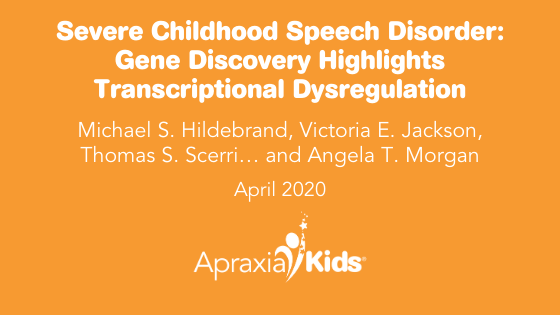
08 May Severe Childhood Speech Disorder: Gene discovery Highlights Transcriptional Dysregulation
A new article was published online April, 2020 from the American Academy of Neurology by researchers in Australia who were looking for specific gene mutations that could account for the diagnosis of CAS in a group of 34 children and their families. The results of extensive genetic testing and analysis identified a group of several effected genes that are important in the production of speech in one third of their group of children. The remaining children did not show any gene mutations that accounted for their diagnosis.
Read the full article summary below:
Severe childhood speech disorder: Gene discovery highlights transcriptional dysregulation
By: Michael S. Hildebrand, PhD, Victoria E. Jackson, PhD, Thomas S. Scerri, PhD, Ingrid E. Scheffer, MBBS, PhD, Melanie Bahlo, PhD, and Angela T. Morgan, PhD
Published online Neurology® April, 2020; 94:1-e20. doi:10.1212/WNL.0000000000009441
Despite intensive investigation over the past 2 decades, we still have little understanding of causes of CAS. In this study, children with CAS underwent thorough speech, developmental and medical assessments and genetic analysis. Thirty-four children identified as having CAS were studied. Genetic mutations were identified in almost a third (11/34, 32%) of the cohort. Gene mutations were identified in several genes, including DK13, EBF3, GNAO1, GNBI, DDX3X, MEIS2, POGZ, SETBP1, UPF2, and ZNF142. The majority of gene changes occurred, de novo, or for the first time in the child examined, rather than being maternally or paternally inherited.
The responsibility of most of these identified genes is to code for DNA binding proteins within the human brain in a process known as transcription. These binding proteins are then responsible for regulating the activation or suppression of the gene based on its job within the brain. These identified genes play a role in the ability of the brain to produce normal speech. A variation in the gene causes a disruption in the gene’s ability to complete its task which then could affect brain functioning at some level.
This study provided new insights into causes for CAS. Findings suggest that there are several subtypes of CAS that are more closely linked with some neurodevelopmental conditions than others. The work confirms that CAS is a genetically diverse condition. Inheritance is most frequently de novo dominant, although recessive and mosaic (having more than one genotype) mutations can also arise. This work suggests as many as one-third of patients may have genetic diagnoses causative for CAS. Findings also show a key role for transcriptional regulation in normal speech development. CAS is a distinctive, socially debilitating clinical disorder, and understanding its genetic basis is the first step towards identifying precision medicine approaches.
Summary provided by Dr. Angela Morgan and Laura Moorer
Click here to read the full article.
A new article was published online April, 2020 from the American Academy of Neurology by researchers in Australia who were looking for specific gene mutations that could account for the diagnosis of CAS in a group of 34 children and their families. The results of extensive genetic testing and analysis identified a group of several effected genes that are important in the production of speech in one third of their group of children. The remaining children did not show any gene mutations that accounted for their diagnosis.
Read the full article summary below:
Severe childhood speech disorder: Gene discovery highlights transcriptional dysregulation
By: Michael S. Hildebrand, PhD, Victoria E. Jackson, PhD, Thomas S. Scerri, PhD, Ingrid E. Scheffer, MBBS, PhD, Melanie Bahlo, PhD, and Angela T. Morgan, PhD
Published online Neurology® April, 2020; 94:1-e20. doi:10.1212/WNL.0000000000009441
Despite intensive investigation over the past 2 decades, we still have little understanding of causes of CAS. In this study, children with CAS underwent thorough speech, developmental and medical assessments and genetic analysis. Thirty-four children identified as having CAS were studied. Genetic mutations were identified in almost a third (11/34, 32%) of the cohort. Gene mutations were identified in several genes, including DK13, EBF3, GNAO1, GNBI, DDX3X, MEIS2, POGZ, SETBP1, UPF2, and ZNF142. The majority of gene changes occurred, de novo, or for the first time in the child examined, rather than being maternally or paternally inherited.
The responsibility of most of these identified genes is to code for DNA binding proteins within the human brain in a process known as transcription. These binding proteins are then responsible for regulating the activation or suppression of the gene based on its job within the brain. These identified genes play a role in the ability of the brain to produce normal speech. A variation in the gene causes a disruption in the gene’s ability to complete its task which then could affect brain functioning at some level.
This study provided new insights into causes for CAS. Findings suggest that there are several subtypes of CAS that are more closely linked with some neurodevelopmental conditions than others. The work confirms that CAS is a genetically diverse condition. Inheritance is most frequently de novo dominant, although recessive and mosaic (having more than one genotype) mutations can also arise. This work suggests as many as one-third of patients may have genetic diagnoses causative for CAS. Findings also show a key role for transcriptional regulation in normal speech development. CAS is a distinctive, socially debilitating clinical disorder, and understanding its genetic basis is the first step towards identifying precision medicine approaches.
Summary provided by Dr. Angela Morgan and Laura Moorer
Click here to read the full article.
Credentials:
Hours of Operation:
Treatment locations:
Address:
,
Phone:
Email:
Overall Treatment Approach:
Percent of CAS cases:
Parent Involvement:
Community Involvement:
Professional consultation/collaboration:
Min Age Treated:
Max Age Treated:
Insurance Accepted:




